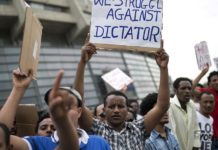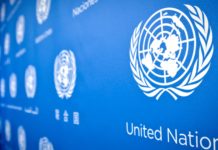As many of you will be aware, the United Nations Commission of Inquiry on Human Rights in Eritrea published its report on 8 June. The report accuses the regime of systematic crimes against humanity and calls for these to be investigated by the International Criminal Court. The report details the use of murder, rape, torture, forced disappearance, indefinite conscription and the government’s shoot to kill policy at the border. The full report is available here.
On 14 April, Patrick Grady MP tabled an Early Day Motion supporting the Commission of Inquiry. The statement gives the Report’s findings the endorsement of the House of Commons, and calls upon the government to do everything in its power to support victims of the Eritrean regime. The full text of the Early Day Motion can be found below:
That this House notes with concern the findings of the 2016 Report by the UN Commission of lnquiry on Human Rights in Eritrea, published on 8 June 2016; further notes that the Commission describes evidence of crimes against humanity by the Eritrean government, including the use of forced and indefinite military service which the report equates with enslavement; notes that the report details the regime’s widespread use of murder, forced disappearance, rape and torture which the regime uses to deter political opposition and instil fear in the population; condemns in the strongest possible terms the systematic human rights violations committed by the Eritrean government as detailed in the report; agrees with the Commission of Inquiry that any and all perpetrators of crimes against humanity should be tried by the International Criminal Court; supports the mandate of the court to investigate any such crimes; and calls on the Government to publicly denounce these gross violations of human rights, do everything in its power to ensure protection for Eritreans fleeing these appalling conditions and support victims of the regime as they seek justice.
Right now Early Day Motion 211 has 14 signatures. Eritrea Focus urges you to get in contact with your local MP and ask that they add their signature in support. Every signatory increases our show of solidarity with the Eritrean people, and puts more pressure on our government to produce a substantial response.
………………………………………………………………
Prime Minister David Cameron describes Eritrea as “deeply undemocratic and autocratic”.
Last month, Patrick Grady MP asked David Cameron the following during Prime Minister’s Questions:
Eritrea was described as the North Korea of Africa at the recent inaugural all-party group meeting, which heard reports of Government-enforced indefinite conscription. The UK FCO advises against travel to areas within 25 km of the Ethiopian border. Will the Prime Minister personally and urgently review Home Office guidance that says that it is safe to transport asylum seekers back to Eritrea?
In response, the Prime Minister said:
I will certainly consider what the hon. Gentleman says. We know that Eritrea is a deeply undemocratic and autocratic country that has done appalling things to its people and that is one reason why so many of those seeking to cross the Mediterranean, normally through the Libyan route, have come from that country. When I had the opportunity to meet the Eritrean leadership, as I did at the conference in Valletta in Malta, I made those points very strongly.
Eritrea Focus is happy to draw attention to the Prime Minister’s condemnation of the Eritrean regime.
………………………………………………………………
DFID funding for child protection services for Eritrean refugees in Ethiopia slashed in 2015/16
At the last meeting of the All-Party Parliamentary Group on Eritrea, Selam Kidane gave an informative and emotive presentation on the plight of Eritrean refugees in Ethiopia. Having listened to Selam’s testimony, Caroline Spelman MP was interested in learning about the UK’s involvement in helping Ethiopia to support refugees from Eritrea. Following the meeting, Ms Spelman submitted the following parliamentary question:
To ask the Secretary of State for International Development, how much funding her Department has provided to (a) the UNHCR and (b) other organisations to support Eritrean refugees in Ethiopia in each of the last three years.
The question was answered by Nick Hurd MP, Parliamentary Undersecretary of State for International Development, who said:
Over the past three financial years DFID has disbursed £16,999,196 to UNHCR in Ethiopia (of which £7,010,225 was in 2013/14, £9,896,334 in 2014/15 and £91,637 in 2015/16).
From this total, £1,108,571 was allocated for child protection services for Eritrean refugees (£368,068 in 2013/14 and £740,503 in 2014/15).
A further £1,846,027 from this total was allocated over the three years in question for core relief items (basic household goods) for all refugees in Ethiopia, including Eritreans.
Funding for Eritrean refugees was not provided directly to any other organisation in Ethiopia.
While figures were not provided for the financial year 2015/16, it is clear that DFID funding for child protection services was slashed in the most recent period. Indeed, if the whole £91,637 given to UNHCR in Ethiopia was spent on child protection services for Eritreans, this would represent a fall in funding of over 87% compared to the previous year.
The need for funding in Ethiopia’s refugee camps is great, with tens of thousands of Eritreans relying on them for support. Eritrea Focus hopes that these changes to DFID’s funding do not reflect widespread withdrawal of support for Eritrean refugees in Ethiopia.
……………………………………………………………………………………………………….
Eritrea Focus is a Think Tank & Research organisation working with multiple non-governmental organisations to advance the democratisation of Eritrea.







